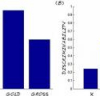Free Online Productivity Tools
i2Speak
i2Symbol
i2OCR
iTex2Img
iWeb2Print
iWeb2Shot
i2Type
iPdf2Split
iPdf2Merge
i2Bopomofo
i2Arabic
i2Style
i2Image
i2PDF
iLatex2Rtf
Sci2ools
113
click to vote
CVPR
2005
IEEE
2005
IEEE
Creating Invariance to "Nuisance Parameters" in Face Recognition
A major goal for face recognition is to identify faces where the pose of the probe is different from the stored face. Typical feature vectors vary more with pose than with identity, leading to very poor recognition performance. We propose a non-linear many-to-one mapping from a conventional feature space to a new space constructed so that each individual has a unique feature vector regardless of pose. Training data is used to implicitly parameterize the position of the multi-dimensional face manifold by pose. We introduce a co-ordinate transform which depends on the position on the manifold. This transform is chosen so that different poses of the same face are mapped to the same feature vector. The same approach is applied to illumination changes. We investigate different methods for creating features which are invariant to both pose and illumination. We provide a metric to assess the discriminability of the resulting features. Our technique increases the discriminability of faces und...
Computer Vision | Conventional Feature Space | CVPR 2005 | Multi-dimensional Face Manifold | Typical Feature Vectors | Unique Feature Vector | Unknown Pose |
| Added | 12 Oct 2009 |
| Updated | 29 Oct 2009 |
| Type | Conference |
| Year | 2005 |
| Where | CVPR |
| Authors | Simon J. D. Prince, James H. Elder |
Comments (0)

